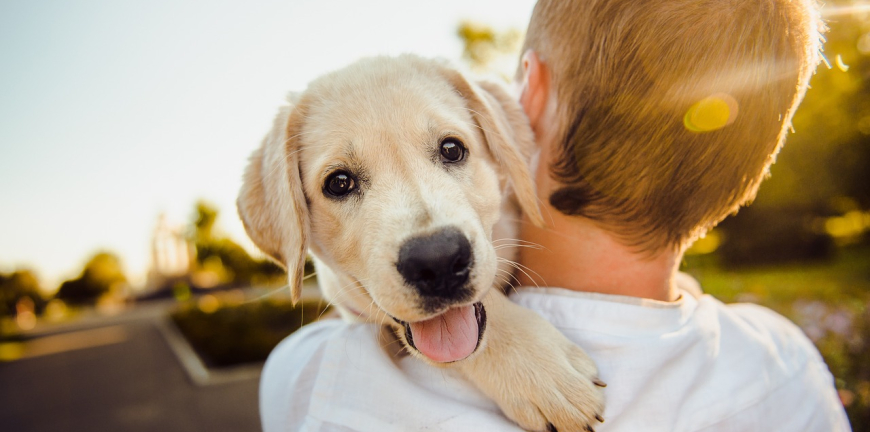June 2, 2024

10 Tips for Bonding with Your New Dog
Whether bringing home a lively puppy or adopting an older companion, there’s much to consider when getting your first dog. From selecting the breed to establishing routines and training basics, you should learn how to get along with your canine companion.
Remember, being a first-time dog owner will come with challenges. However, with time, patience, and dedication, your reward will be a deep and fulfilling relationship with your canine companion.
Check out these ten tips to get along with your new dog.
Research Friendly Dog Breeds
Different breeds have distinct temperaments and personality traits. Some breeds are known for energy, while others are laid-back. Some breeds require lots of exercise and mental stimulation to thrive, while others may be content with short walks or play sessions.
Larger breeds may need more space to roam and play, while smaller breeds can adapt well to apartment living. There is a lot to consider, but one thing is sure–there’s a breed out there for everyone.
Puppy-Proof Your House
Puppies are naturally curious animals. They love exploring their surroundings, so taking steps to prevent accidents and protect them from potential hazards is essential. Identify and remove any items that could harm your puppy. These might include toxic plants, household chemicals or medications, and small objects that could be swallowed.
Use baby gates or pet barriers to block off areas of your home that are off-limits to your puppy, such as staircases, balconies, or rooms with fragile or dangerous items. Offer your puppy a variety of durable chewing toys to redirect their chewing behaviour away from household items.
Establish Routine for Housebreaking
Dogs thrive on predictability and structure. A consistent routine helps them feel secure and stable. A regular feeding schedule, outside potty breaks, and walks all work together to establish good bathroom habits, making potty training easier for your puppy.
Designate an area in your yard and take your puppy outside to this spot consistently throughout the day, such as after meals, after waking up, and before bedtime. A routine also ensures adequate play, walking, and enrichment opportunities.
Nutrition
Puppies and older dogs have nutritional needs. Feed your dog food appropriate for its age, size, and activity level. Brands like Open Farm dog food or in Australia, Frontier Pets, Black Hawk and Ivory Coast are just some that give dogs all the nutrients, vitamins, and minerals needed to thrive.
The dog food you choose will play a key role in maintaining your dog’s ideal body condition and weight and helping prevent obesity and related health problems. A dog food that meets your dog’s nutritional requirements supports overall health and vitality, allowing your dog to enjoy a long, happy, and active life by your side.
Basic Training and Positive Reinforcement
Basic training teaches your dog basic commands such as sit, stay, come, down, and leave. These commands help you effectively communicate your expectations and manage your dog’s behaviour. Training your dog using positive reinforcement builds trust and mutual respect between you and your furry companion.
Socialization
Introduce your dog to many different people, animals, and environments from a young age to help them become well-adjusted and confident adults. Early socialization can prevent fearfulness, anxiety, and aggression in dogs.
Socialization prepares puppies for life in the human world by teaching them essential life skills and manners. It helps them learn how to navigate social interactions and communicate effectively, which sets them up for success as they grow.
Exercise
Dogs are naturally active animals that thrive on regular physical activity and mental stimulation. Daily walks, play sessions, and interactive toys are all effective ways to keep your pup entertained and happy. And it’s not just about their physical health.
Dogs that get enough exercise are generally happier, calmer, and better behaved. Regular physical activity burns off all that excess puppy energy. It reduces pent-up frustration or anxiety, which can manifest itself as destructive behaviour, excessive barking, or hyperactivity.
Veterinary Care
Schedule regular veterinary check-ups to ensure your dog stays healthy and up to date on vaccinations, parasite prevention, and dental care. Veterinary care is essential for maintaining your dog’s health, preventing illness, and ensuring a high quality of life.
Patience and Love
Above all, be patient and loving with your new furry family member. Building a strong bond takes time, but the love and companionship you’ll receive are priceless. Training and caring for a dog can be challenging, but patience and love help you stay resilient and persevere through setbacks and obstacles.
Like humans, dogs are not perfect. They may struggle with certain behaviours or require extra time and effort to learn new skills. However, by remaining patient and supportive, you can overcome these challenges.
Read next: https://www.pet-friendlyaccommodation.com.au/5-tips-to-prepare-your-dog-for-a-road-trip/